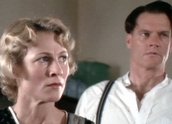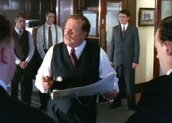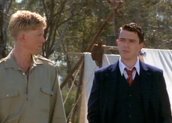


My Brother Jack (2001)
Synopsis
Set in the years following the First World War and ending in the midst of the Second World War, this is the story of the Merediths, a working-class family living in Melbourne. David Meredith (Matt Day) is the second son of tram driver Jack Meredith (William McInnes) and his wife Minnie (Angie Milliken), a nurse. Jack (Simon Lyndon) is David’s elder brother. It records David’s transformation from a timid child, born with acute powers of observation and a too-vivid imagination, into an apparently confident and successful writer via a difficult adolescence under an abusive father. In the process it also becomes a record of the changing social mores of that restless time between the First and Second World Wars.
Curator’s notes
This series is based on George Johnston’s My Brother Jack (1964), winner of the Miles Franklin Award and considered an Australian classic. It is not about the character of Jack Meredith Junior but about his brother David, often referred to as 'Davey’. Davey is also the narrator and readers are privy to the darkest secrets of his soul and witness to a character that is the epitome of the anti-hero: craven, self-centred, facile, disloyal and ethically lazy, with the potential in adulthood to be both cruel and cynical. His only redeeming qualities are his great ability to see and describe beauty and virtue in all its forms and the searing honesty with which he reveals himself to his readers; though only to his readers, and not to any character in the book.
For this reason, it is hard to think of a novel more difficult to turn into a screenplay. Johnston’s partner, Charmian Clift, adapted the book into a 10-part black-and-white series for the ABC back in 1965. Now, nearly 40 years later, it has been adapted by writers Sue Smith and John Alsop. Chunks of the book in voice-over help us to understand what’s going on in Davey’s head, informing us for example of the great relief he feels when his demands to be allowed to join up at the outbreak of the Second World War are forcefully rejected by the editor of his newspaper, Bernard Brewster (Jack Thompson).
The voice-over is used to best effect in the second half of the mini-series, which deals more confidently with the psychological aspects of the story. This is partly because Davey’s public persona and private life are better defined in adulthood and the gap is now wide enough for the differences to show. It is also partly because he meets a few people who get to know him rather better than he thinks – his wife Helen Midgeley (Ellouise Rothwell) and especially his close friend and colleague Gavin Turley (Robert Menzies). Like the eponymous brother Jack, these are people who love Davey despite his flaws but, unlike Jack, they have a better understanding of where those flaws are taking him. Jack himself has always been aware of his little brother’s weaknesses but inclined because of his own straightforward and optimistic nature to believe that he will 'grow out of it’ and is convinced in the end that he has.
Matt Day is particularly well cast as Davey. He is able, when the opportunity arises, to let slip the insecure and fearful creature that lives within and allow us to feel something of the pain of knowing that his life is a sham. Ken Cameron has put together a uniformly proficient supporting cast. Notable among them are Jack Thompson as crusty editor Bernard Brewster, Felix Williamson as the arch but gentle Sam Burlington, and Robert Menzies as Gavin Turley. Ellouise Rothwell as silky, super-efficient Helen and Nick Russell as the adolescent Davey, were relative newcomers to the industry at the time but do more than hold their own in this experienced company.
My Brother Jack first aired on Network Ten in 2001. Part One drew an Australia-wide viewing audience of approximately 1.7 million, the highest to date of any mini-series made since the changeover in the ratings system in January of the same year and about the same as Titanic (1997), the fifth most-watched feature to air in that year. The mini-series won several awards including an AFI Award in 2001 for Best Mini-Feature or Television Series and another for Angie Milliken as Best Actress in the same category. There were several other nominations including Ken Cameron for Best Direction in a Television Drama and Jo Ford for Production Design. In 2002, William McInnes won a Silver Logie for Most Outstanding Actor and Russell Bacon was awarded the Golden Tripod and named Cinematographer of the Year by the ACS.
- Overview
- Curator’s notes
- Video 3 clips
- Principal credits
- Find a copy
- Make a comment
- Map
- Add your review



